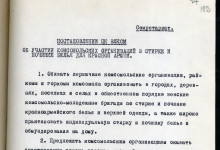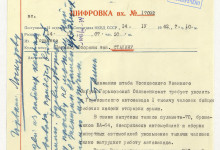
Unknown documents from personal collections of J. Stalin and collections of the central authorities tell how the USSR was defended during the Great Patriotic War
More than 450 documents from the Russian State Archive of Socio-Political History of the period June 22, 1941 - November 19, 1942 are now available in the Collection of Digitized Archival Documents, Film and Photo Materials dedicated to World War II and on the Presidential Library’s portal subordinate to the Administrative Directorate of the President of the Russian Federation.
Today, the volume of the Collection exceeds about 10 thousand materials including maps, diagrams, periodicals, photographs, newsreels for the period from January 1933 to November 1942.
The Collection has been entered with documents from personal collections of J. Stalin, V. M. Molotov, A. I. Mikoyan, A. A. Zhdanov, G. M. Malenkov, E. M. Yaroslavsky, as well as the collections of the Politburo and the Organizing Bureau of the Central Committee of the CPSU (b) and departments of the Central Committee of the All-Union Communist Party of Bolsheviks, the Central Committee of the Komsomol, the Central Headquarters of the partisan movement.
The resolutions of the Politburo of the Central Committee of the All-Union Communist Party of Bolsheviks spotlight the restructuring in public administration and the creation of new state and military bodies and committees: the Headquarters of the High Command of the Armed Forces of the USSR, the USSR State Defence Committee, the Council for Evacuation Affairs, the Committee for Food and Clothing Supply, the Committee for the Distribution of Labor forces, etc., on the appointment of people's commissars and their deputies. They also provide an opportunity to learn about the progress of the evacuation of front-line factories, the population and archives. The Politburo also considered agricultural issues, such as harvesting and food distribution.
The documents of the departments of the Central Committee of the All-Union Communist Party of Bolsheviks contain information on the progress of mobilization throughout the Soviet Union, the mood of the population in connection with the outbreak of war, the measures taken to protect Soviet cities, the state of air defence and the construction of bomb shelters, the camouflage of individual objects, the collection of funds and things for the Red Army, the work of evacuation hospitals.
The situation in the temporarily occupied territory of the USSR and the cruelty of the Nazis against the civilian population are told by the reports of the Intelligence Directorate of the NKVD of the USSR, deposited in the materials of the Department of Agitation and Propaganda of the Central Committee of the All-Union Communist Party of Bolsheviks, as well as orders of the occupation authorities, stored in the collections of the Central Headquarters of the partisan movement. The documents of the collections give an idea of the formation of a powerful partisan movement, the vigorous activity of partisan detachments behind enemy lines, and the creation of partisan schools. Among the presented documents are operational plans and maps of massive one-time attacks by partisan detachments on enemy communications.
The documents of the Komsomol Central Committee spotlight the participation of Komsomol organizations in combat operations on the fronts and their underground activities behind enemy lines in the temporarily occupied territories of the USSR.
The personal collections of J. Stalin, V.M. Molotov, A. I. Mikoyan, A. A. Zhdanov, G. M. Malenkov present the situation on the fronts and the course of combat operations, as well as the situation in Leningrad, its siege and assistance to the population - the construction of a winter road across Lake Ladoga and a gas pipeline along the bottom of Ladoga.
The Collection also features documents on the formation of the anti-Hitler coalition: correspondence between J. Stalin and W. Churchill, F. Roosevelt, the USSR Ambassador to Great Britain I. M. Maisky, records of conversations between Stalin and Molotov with the British Ambassador S. Cripps, personal representative of the President USA in Moscow G. Hopkins about the joint struggle against Germany, the opening of a second front and Lend-Lease supplies.
In accordance with the List of instructions for the implementation of the Address of the President of the Russian Federation to the Federal Assembly of the Russian Federation dated January 15, 2020, the organizers of the Collection of Digitized Archival Documents, Film and Photo Materials "World War II in Archival Documents" are the Federal Archival Agency (Rosarkhiv), the Administrative Directorate of the President of the Russian Federation and the Presidential Library.
The Collection is carried out by Rosarkhiv and federal state archives with the participation of the Ministry of Defence of the Russian Federation, the Ministry of Internal Affairs of the Russian Federation, the Ministry of Foreign Affairs of the Russian Federation, the Federal Security Service of the Russian Federation, the Foreign Intelligence Service of the Russian Federation, the state archives of Belarus and others.
Archival documents of the Collection World War II in Archival Documents are available from anywhere in the world thanks to the Presidential Library’s portal. Especially for the foreign audience, the titles and annotations to the documents as well as the texts of the accompanying articles are also available in English.
In addition to digitized archival documents the Collection contains a list of the main Internet projects, databases, other thematic Internet publications of documents, virtual tours of the history of World War II, developed by government agencies of the constituent entities of the Russian Federation and various organizations.












